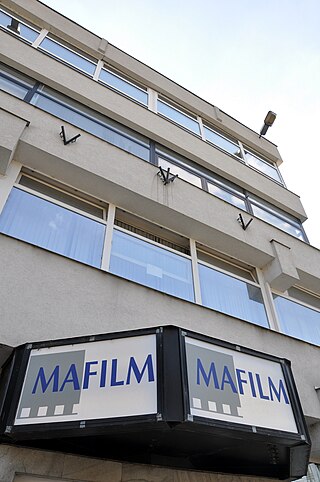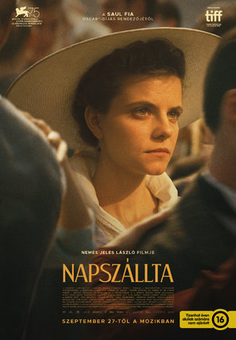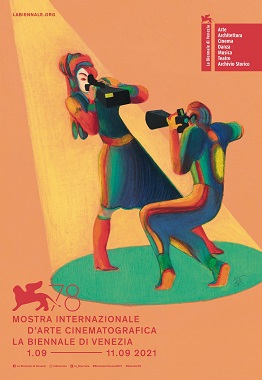
Budapest Honvéd Football Club, commonly known as Budapest Honvéd or simply Honvéd, is a Hungarian sports club based in Kispest, Budapest, with the colours of red and black. The club is best known for its football team. Honvéd means the Homeland Defence. Originally formed as Kispest AC, they became Kispest FC in 1926 before reverting to their original name in 1944.

István Szabó is a Hungarian film director, screenwriter, and opera director.

Hungary has had a notable cinema industry since the beginning of the 20th century, including Hungarians who affected the world of motion pictures both within and beyond the country's borders. The former could be characterized by directors István Szabó, Béla Tarr, or Miklós Jancsó; the latter by William Fox and Adolph Zukor, the founders of Fox Studios and Paramount Pictures respectively, or Alexander Korda, who played a leading role in the early period of British cinema. Examples of successful Hungarian films include Merry-go-round, Mephisto, Werckmeister Harmonies and Kontroll.

László Nemes is a Hungarian film director and screenwriter. His 2015 debut feature film, Son of Saul, was screened in the main competition at the 2015 Cannes Film Festival, where it won the Grand Prix. He is the first Hungarian director whose film has won a Golden Globe for Best Foreign Language Film. Son of Saul is the second Hungarian film to win the Academy Award for Best Foreign Language Film. In 2016, Nemes was a member of the main competition jury of the 2016 Cannes Film Festival.

Judit Elek is a Hungarian film director and screenwriter. She directed 16 films between 1962 and 2006. Her film Mária-nap was screened in the Un Certain Regard section at the 1984 Cannes Film Festival.

Mihály Víg is a Hungarian composer, poet, songwriter, guitarist, singer and actor.
The Hungarian Tennis Championships also known as the Hungarian National Championships or the Hungarian Closed Championships is a professional tennis tournament played on outdoor clay courts. It is currently part of the official Tennis Calendar of Hungary of the Hungarian Tennis Association and is a gentlemen's and ladies' event.

Peter Hegedüs is a Hungarian/Australian writer, director and producer of both documentary and fiction films. He is also the grandson of the former Prime Minister of Hungary, András Hegedüs. Hegedüs' work explores critical social justice issues. His most recent film, Sorella's Story, was selected to screen at the Venice International Film Festival.

Mafilm was established in 1948. It has been the largest and most significant film studio in Hungary and a strategic base for the Hungarian film industry. Mafilm's history has lived days of glory, just as it has survived severe deaths. The roots of its birth go back to Kolozsvár, and his ancestors included Europe's third-largest silent film factory. Ever since Korda Sándor founded the predecessor of Mafilm, film production has been going on here without stopping. The importance of the place is also enhanced by the fact that there are almost no Hungarian filmmakers who have not learned the basics of film profession here. Mafilm's history with its predecessors covers more than 100 years of the history of Hungarian film history.

The CineFest Miskolc International Film Festival is an annual film festival held in the town of Miskolc, in Hungary. It was founded under the name of Festival of Young Filmmakers in 2004 with a focus on filmmakers under the age of 35. The festival now presents feature films, shorts, documentaries, and animated films. All programs, screenings, conferences, and exhibitions are free to attend.

Dávid Géczy is a Hungarian Chicago Silver Hugo prize, Cannes Silver Dolphin and Berlin Red Dot winner film director and screenwriter.

Sunset is a 2018 Hungarian historical drama film co-written and directed by László Nemes. It is set in Budapest before World War I, starring newcomer Juli Jakab and Vlad Ivanov. It premiered at the 75th Venice International Film Festival and was also screened at the 2018 Toronto International Film Festival. It was selected as the Hungarian entry for the Best Foreign Language Film at the 91st Academy Awards, but it was not nominated.
Curtiz is a 2018 Hungarian film by Tamás Yvan Topolánszky, based on the making of the 1942 Humphrey Bogart film Casablanca by Hungarian director Michael Curtiz.

The 78th annual Venice International Film Festival was held from 1 to 11 September 2021.
Meteo is a 1989 Hungarian science-fiction art film directed by András Mész. Underground tunnel scenes were shot in the Kőbánya cellar system, Budapest. and the factory scenes were shot in the Kőbánya brewery. The film quickly gained cult status in Hungary after its release.

Dénes Nagy is a Hungarian film director, editor and screenwriter. His first feature film, Natural Light was awarded the Silver Bear for Best Director in 2021.
Tamás Yvan Topolánszky is a Hungarian film director, screenwriter, producer, winner of several international awards.

Elk*rtuk is a 2021 Hungarian political drama action thriller film, centered around the 2006 Öszöd speech, made by former Hungarian Prime Minister Ferenc Gyurcsány, the leaking of said speech, and its subsequent consequences. It was directed by Keith English.

Explanation for Everything is a 2023 Hungarian-Slovak drama film directed by Gábor Reisz, who co-wrote the screenplay with Éva Schulze.

Erasing Frank is a 2021 Hungarian drama film written and directed by Gábor Fabricius.
















